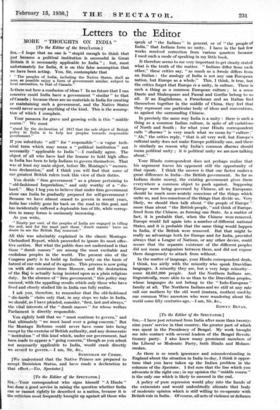Letters to the Editor
MORE " THOUGHTS ON INDIA "
[To the Editor of the SPECTATOR.]
-hope that no one is stupid enough to think that just because a political institution is successful in Great Britain it is necessarily applicable to India" ; but, most unfortunately for India, it is on this false assumption that we have been acting. You, Sir, contemplate that
" The peoples of India, including the Native States, shall as soon as possible enjoy a form of government similar, subject to local necessities, to that of Canada."
Is there not here a confusion of ideas ? In no future that I can conceive could India have a government " similar " to that of Canada ; because there are no materials in India for creating or maintaining such a government, and the Native States would never accept anything of the kind. This is the assump- tion of which I complain.
Your panacea for grave and growing evils is this " middle course." We must
" stand by the declaration of 1917 that the solo object of British policy in India is to help her peoples towards responsible government."
If you substitute " self " for " responsible "—a vague tech- nical term which may mean a " political institution " not necessarily " applicable to India "—I cordially agree. The object of all who have had the honour to hold high office in India has been to help Indians to govern themselves. That was at least my main object, before Mr. Montagu's " momen- tous declaration," and I think you will find that some of our greatest British rulers took this view of their duties.
You deride " firm government " as a phrase pertaining to " old-fashioned Imperialism," and only worthy of a " die- hard." May I beg you to believe that under firm government alone can India be gradually prepared for self-government ? Because we have almost ceased to govern in recent years, India has visibly gone far back on the road to this goal, and has incidentally suffered a deplorable loss of life, while corrup- tion in many forms is ominously increasing.
As you write,
" Ninety per cent. of the peoples of India are engaged in tilling the soil, and for the most part these ' dumb masses ' have no desire to see the British Raj removed."
All this was admirably explained in the classic Montagu- Chelmsford Report, which proceeded to ignore its most effec- tive section. But what the public does not understand is that these " dumb masses " are among the most excitable and credulous peoples in the world. The present aim of the Congress party is to build up Indian unity on the basis of hatred of our rule and of its agents. This process is now going on with able assistance from Moscow, and the destruction of the Raj is actually being insisted upon as a plain religious duty. In the absence of " firm government," this policy may succeed, with the appalling results which only those who have lived and closely studied life in India can fully realize.
I ask you, therefore, to remember that the old-fashioned " die-hards " claim only that, in any steps we take in India, we should, as I have pleaded, consider, "first, last and always," the vital interests of the " dumb masses " for whose welfare Parliament is directly responsible.
You rightly hold that we " must continue to govern," and that ultimately " we must hand over a going concern." But the Montagu Reforms could never have come into being except by the exercise of British authority, and any democratic " institution 7 of this kind which, under our government, had been made to appear a " going concern," though as you admit not necessarily applicable to India, would crash directly we ceased to govern.—I am, Sir, &c.,
SYDENHAM OF COMBE.
.[We understand that the Native Princes are prepared to accept Dominion Status, and have made a declaration to that effect.—En. Spectator.]










































 Previous page
Previous page